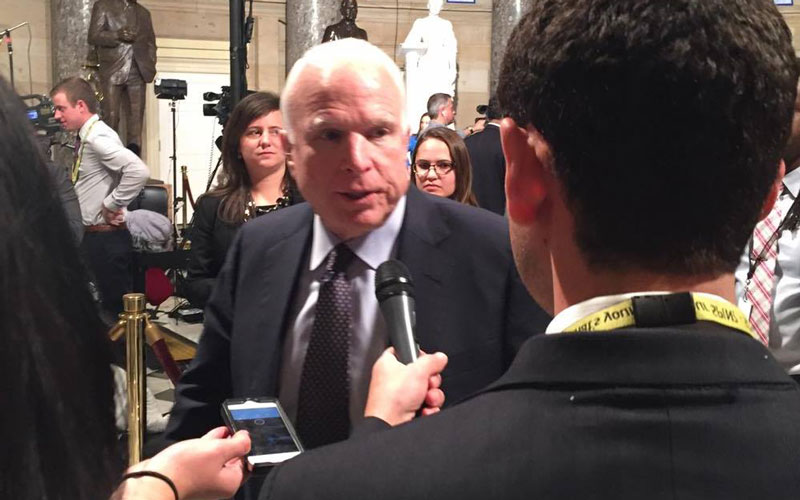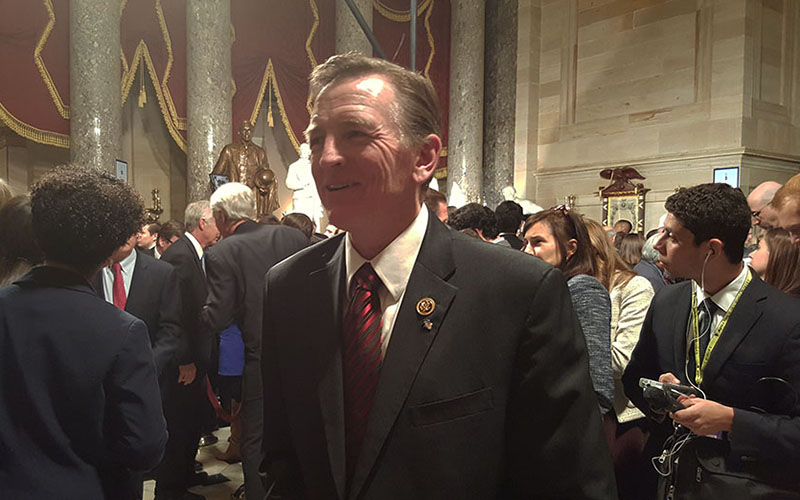
Sen. Jeff Flake, R-Arizona, said he thought the president missed a chance to talk about “big legacy-building issues” like entitlement reform. (Photo by Samantha Witherwax/Cronkite News)

Sen. John McCain, R-Arizona, criticized the president for not mentioning recent acts of terrorism in his address. (Photo by Jessica Swarner/Cronkite News)

Rep. Paul Gosar, R-Prescott, said be was disappointed in the State of the Union speech, which he called little more than fluff. (Photo by Madison Alder/Cronkite News)
WASHINGTON – President Barack Obama delivered a final State of the Union address Tuesday that focused on his administration’s triumphs while looking toward the country’s future.
The aspirational, nearly hour-long speech, painted a nation “in a time of extraordinary change – change that’s reshaping the way we live, the way we work, our planet and our place in the world,” Obama said.
The address, interrupted 93 times by mostly Democratic applause, touched on everything from the economy and foreign affairs to civil rights and a call to cure cancer.
“The future we want – opportunity and security for our families; a rising standard of living and a sustainable, peaceful planet for our kids – all that is within our reach,” Obama said.
“But it will only happen if we work together. It will only happen if we can have rational, constructive debates. It will only happen if we fix our politics.”
Rep. Raul Grijalva, D-Tucson, welcomed the tone, both for Obama’s focus on changing the “us vs. them” mentality of politics as well as touching on issues like climate change, which Grijalva called especially important for the Southwest and its current water shortages.
“Being aspirational, asking us to be more than we are right now is a good way for him to end his last speech in front of Congress,” Grijalva said.
But others were not as impressed, calling the speech everything from “fluff” to a premature attempt by a lame-duck president to build a legacy.
Sen. Jeff Flake, R-Arizona, said as he headed in to the speech that he was concerned the president would neglect to comment on issues Flake considers important.
“What I would love to hear is a commitment to big issues, like entitlement reform, some big legacy-building issues,” Flake said. “That’s what I hope we hear. But probably not. State of the Union addresses are usually overrated.”
The president did touch on some entitlement issues, such as strengthening benefits for Medicare and Social Security.
It was only the second time Obama had addressed a Congress in which both chambers were controlled by Republicans. He praised new House Speaker Paul Ryan, saying the Wisconsin Republican is openly engaging with both parties to reach decisions, such as tackling poverty. He later encouraged Congress and the American public to do the same.
That did little for Rep. Paul Gosar, R-Prescott, who said the speech was mostly fluff.
“Now if you are truly a visionary, it means you’re predicting increasing liberties of freedom, not the opposite is true,” Gosar, said of what he sees as the president’s track record. “When this administration shows it has a legacy of lawlessness, and actually weaponizes agencies to enforce it, you have a problem.”
Sen. John McCain, R-Arizona, criticized Obama for not taking a more radical approach to terrorist groups, noting Iran’s capture earlier in the day of two U.S. Navy ships.
“As we’ve seen in Paris and San Bernardino, ISIL’s threat to our homeland is real, direct, and growing,” McCain said in a prepared statement released after the speech. “But President Obama squandered yet another opportunity to articulate a coherent strategy to achieve ISIL’s lasting defeat.”
He accused the president of settling into the “lame-duck portion of his presidency,” and working to burnish his legacy instead of confronting problems.
Rep. Ruben Gallego, D-Phoenix, praised the speech for its lofty goals and optimistic tone. His only concern was that he did not think the president went far enough to push the issue of immigration reform.
“I think the president could have covered a little more deeply his commitment to comprehensive immigration reform,” Gallego said.
“It’s something that is very important in Arizona,” he said. “I think enunciating that in his last term in a stronger manner would have been more helpful.”
– Cronkite News reporters Madison Alder, Katie Bieri, Lauren Clark, Marisela Ramirez, Wafa Shahid, Jessica Swarner and Samantha Witherwax contributed to this report.
